Internal control over financial reporting
The Electrolux Control System (ECS) has been developed to ensure accurate and reliable financial reporting and preparation of financial statements in accordance with applicable laws and regulations, generally accepted accounting principles and other requirements for listed companies. ECS adds value through clarified roles and responsibilities, improved process efficiency, increased risk awareness and improved decision support.
ECS is based on the framework for internal control issued by the Committee of Sponsoring Organizations of the Treadway Commission (COSO). The five components of this framework are control environment, risk assessment, control activities, monitor and improve and inform and communicate.
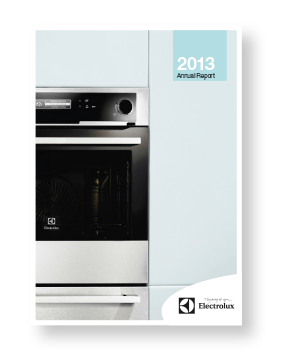
Control environment
The foundation for the Electrolux Control System is the control environment, which determines the individual and collective behavior within the Group. It is defined by policies and procedures, manuals, and codes, and enforced by the organizational structure of Electrolux with clear responsibility and authority based on collective values.
The Electrolux Board has overall responsibility for establishing an effective system of internal control. Responsibility for maintaining effective internal controls is delegated to the President. The governance structure of the Group is described on page 148. Specifically for financial reporting, the Board has established an Audit Committee, which assists in overseeing relevant manuals, policies and important accounting principles applied by the Group.
The objective of ECS is to quality assure theinternal and external financial reporting.
The limits of responsibilities and authorities are given in instructions for delegation of authority, manuals, policies and procedures, and codes, including the Electrolux Code of Ethics, the Electrolux Workplace Code of Conduct, and the Electrolux Policy on Corruption and Bribery, as well as in policies for information, finance and credit, and in the accounting manual. Together with laws and external regulations, these internal guidelines form the control environment and all Electrolux employees are held accountable for compliance.
Responsibility for internal control is defined in the Electrolux Internal Control Policy. All entities within the Electrolux Group must maintain adequate internal controls. As a minimum requirement, control activities should address key risks identified within the Group. Group Management have the ultimate responsibility for internal controls within their areas of responsibility. Group Management is described on pages 160–161.
The Electrolux Control System Program Office, a department within the Internal Audit function, has developed the methodology and yearly time plan for maintaining the Electrolux Control System. To ensure timely completion of theseactivities, specific roles aligned with the company structure, with clear responsibilities regarding internal control, have been assigned within the Group, see table Electrolux Control System – Roles and responsibilities above.
Over the last years, training and support have been provided to the thousands of persons with assigned ECS roles globally. The objective of the training has been to educate in risk and internal control and provide hands-on tools and techniques in order to effectively carry out the assigned responsibilities. These training sessions have been a mix of regional training sessions, computer-based training modules and net meetings.
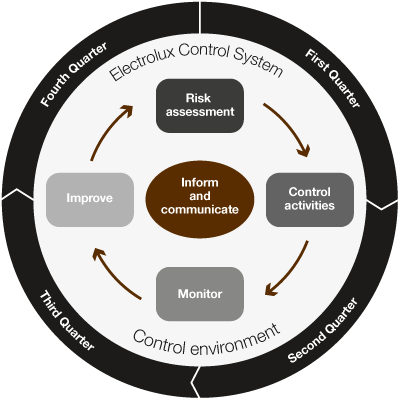
Control environment — Example trade receivables
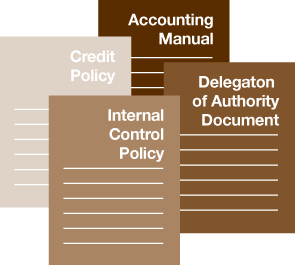
Accounting Manual
Rules for revenue recognition and calculation of provision for doubtful trade receivables.
Credit Policy
Rules for customer assessment and credit risk that clarify responsibilities and are the framework for credit decisions.
Delegation of Authority Document
Details the approval rights, with monetary, volume or other appropriate limits, e.g., approval of credit limits and credit notes.
Internal Control Policy
Details responsibility for internal controls. Controls should address the Minimum Internal Control Requirements (MICR) within every applicable process, for example “Order to Cash”.
Electrolux Control System – Roles and responsibilities (for larger reporting units)
| Role | Sector/Group staff internal control coordinator | Reporting unit internal control coordinator | Process owner | Control operator | Management tester |
|---|---|---|---|---|---|
| Typically who | Senior person within the Finance organization in the Sector or Group Staff function. | Controller or CFO for the reporting unit. | Person with overall responsibility for the process, e.g., warehouse manager, purchase manager, sales manager. | Person performing the daily activities within the process, i.e. warehouse operator, accounts payable clerk, accounts receivable clerk. | Person with process knowledge but not performing daily activities in the process to ensure independence. |
|
Main responsibilities |
|
|
|
|
|
CEO Statement

In 2013 we continued to deliver above our growth target and delivered 4.5% in organic sales growth.
CEO Statement

I'm convinced that raising product efficiency for the growing middle class is where long-term shareholder value creation lies.
Our products
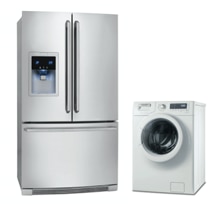
Electrolux is the only appliance manufacturer in the industry to offer complete solutions for both consumers and professionals. The focus is on innovative and energy-efficient products in the premium segments.
Sustainability
Achieving the Group's vision of sustainability leadership is crucial to realizing the business strategy. The objective is to develop smarter, more accessible, resource-efficient solutions that meet people's needs and improve their lives. Read the comprehensive sustainability performance review.
Awards & recognition
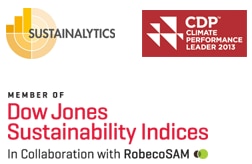
Financial Reporting
Net sales for the Electrolux Group in 2013 amounted to SEK 109,151m, as against SEK 109,994m in the previous year. The organic sales growth was 4.5%, while currencies had an impact of -5.3%.
